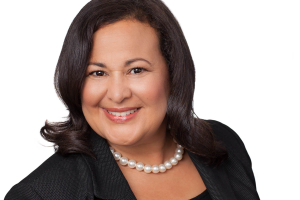Senior Counsel Carolyn Samiere has been with Paragon for seven years, serving technology, life sciences, and pharma/biotech clients in the areas of compliance, contracting, licensing, and corporate governance. Her impressive legal career has spanned corporate, litigation, and regulatory work, and now she brings that wide skillset to her Paragon clients.
We recently sat down with Carolyn to discuss what she loves about working at Paragon, the ever-elusive work/life balance, future trends in the legal industry, and more.

Carolyn Samiere
What initially got you interested in law?
For me it started in sixth grade – I guess I was a very young activist. I began to see myself as a lawyer championing the causes of people who didn’t have a voice, and I think even at that tender age, I could see inequities in our social systems.
I saw barriers to justice that affected immigrants, people with low income, people of color. Through academic life, I took an even stronger interest in social justice causes and realized that the field of law could be a vehicle to effect change.
Was there anything that made you gravitate toward your current areas of practice?
Initially, my focus was on entertainment and sports law. I worked for a variety of boutique law firms in San Francisco and Los Angeles in those areas, but along the way I developed litigation skills and my career drifted more toward trial work than transactional work.
I then returned to the Bay Area and took a position with the Securities and Exchange Commission. Toward the end of my tour at the SEC, I felt that my place was inside the corporations, where I could best help prevent the irregularities and catastrophes I’d seen at the SEC, the kinds of things that threaten the viability of otherwise really good corporations.
After leaving the SEC, I took a position at a major national university, supporting their research and development business, and then moved to a private research and development corporation in Silicon Valley with a very robust, federally supported research program.
This gave me great exposure into the world of technology, and I started learning everything I could about it, particularly in the biotech and life sciences sectors. Eventually I started my own solo law firm in this area.
The big geek in me loved everything that came with that area — the lectures, meeting rockstar scientists, and being able to work around laboratories. Being in that environment is a little bit of a Disneyland for me.
What led you to Paragon and what is it like working there?
I enjoyed working for my own clients at my solo firm, but I missed the buzz and excitement of working for an innovative firm, the diversity of work you get working in technology, and being a witness to cutting-edge innovations.
I’d been watching Paragon’s growth for several years and I was really attracted to their model. I completely identified with Paragon’s mission of achieving a greater balance between work and lifestyle. I have to say, working with Paragon was the first time in my law career that I began to truly enjoy practicing law.
Generally, the workday is eight hours. With a few exceptions, you don’t work on weekends, and then only if you want to. Paragon works really hard to understand what my preferences are, what I’m interested in, and how many hours I want to work. Then they carefully call out several projects and present them to me. If I show an interest, we go forward with the client to see if there’s a match.
Even after I’m on a project, I have a say in how I work, what my hours will be, and how I do them throughout the day.
There’s also so much more to Paragon than just the work that I do in the office. There’s a whole lifestyle around being a Paragon member, from fabulous parties to annual outings to CLE-eligible presentations.
I can’t overstate how much I enjoy the Paragon community life. It’s refreshing and makes me feel very supported. Paragon goes out of its way to make me feel that I’m wanted and valued there.
What was your favorite Paragon client or engagement you worked on and why?
Several years ago, I took on a project working with a large company’s privacy, legal, and data teams to map its data paths throughout the company. I learned a great deal about the lifecycles of data that are regularly generated by companies and the myriad places where data can copy itself, plant those copies, and hide in those systems.
This type of analysis is integral to corporations’ compliance with evolving privacy regulations, particularly for corporations in California. Coming out of that project, I gained not only nearly expert-level experience in data, but also a useful practical knowledge of what compliance really looks like for corporations.
Every project I’ve taken on since then has included some aspect of privacy and data management.
In what Paragon project were you able to provide the biggest impact for the client? How?
One project has a special place in my heart. I was working with a drug and device development company and was asked to join a team focused on distributing life-saving therapies and services throughout the world, particularly for women in developing countries.
I worked with the company’s senior executives, scientists, and doctors in negotiating the distribution deal. The services and therapies were expected to reduce mortality rates among women and young children living in those countries.
It really put my client on the map as a huge contributor to the welfare of people in underserved communities.
What are your passions outside of work?
My greatest passion is dance. Since my youth I’ve invested a lot of time in it, and working at Paragon allows me to slip out and take evening dance classes. I also like to garden, and I’ve kept up my interest in social justice issues and access to law.
I’m able to do some pro bono work, including mediations for cases in our local courts. Paragon allows and encourages its attorneys to seek out their preferred pro bono activities.
How do you see the legal industry evolving in what will likely be a workflow that includes some remote component?
I think the reality is that the hybrid workplace is here to stay. Employees are demanding it, not just in law, but in other sectors as well. We all now know that it’s manageable. As software and tech companies develop more effective apps and programs, it’s becoming easier to work securely in remote places, and this feeds the lifestyle objectives of employees.
This also brings with it some issues that have to be tackled. Attorneys have to maintain confidentiality and privacy, so the markets are certainly going to seize on this opportunity and develop solutions for that. I also think that attorneys will have a greater opportunity to participate in meetings and choice projects, because everyone has the same availability, whether working in the office or remotely.
At the same time, I think it’s important for law departments to stay vigilant in ensuring that individual attorneys’ advancement potential isn’t stunted by working remotely. This does place the questions about remote work front and center in the issue of pay equity and how remote work can play into the metrics for determining pay equity.
I also think that moving away from remote work would cause a lot of disruption and an even greater exodus from the workforce. Remote work is a competitive advantage for corporations in recruiting, because employees now have options on how they work.
What legal trends do you think will be important in the second half of 2022 and heading into 2023?
I think there are several big ones. The first is privacy. As new technologies are developed for the transfer of sensitive data, there are always concerns about security breaches, and how they can be prevented. Covid vaccination campaigns have also raised all new privacy concerns. Companies and organizations that have never touched sensitive private data are now collecting it, so I think we’re going to see an uptick in the development of technical products for storage and security of that data.
Another is the exodus of corporate employees and how companies are now forced to fill those seats with a mix of permanent and temporary employees and outside consultants. It’ll be interesting to see if this new composite workforce generates significant changes in the labor law and whether labor standards will loosen or tighten.
Diversity and inclusion is still a very hot topic, and I think it’s going to remain so for the foreseeable future. Again, this is another recruiting advantage. Employees are demanding a diverse and inclusive workplace. The pandemic shifted the spotlight to new categories of disenfranchised employees and how remote work impacts them. I think we’ll see robust corporate diversity and inclusion policies and strategies. They’re no longer just nice to have, they’re now essential for corporate survival.
Finally, I think we’re going to see louder conversations about government sustainable and renewable energy mandates, especially in this coming year. To meet the legislative deadlines for elimination of fossil fuels that many states have implemented, there has to be early action. I think we can expect corporate responsibility initiatives to emerge.
Since corporations are the largest energy consumers, this movement has implications for corporate lawyers. It’s going to bring with it the need to restructure corporate policies on internal energy management and generate new business contractual provisions that require providers and vendors to adopt climate control strategies and use renewable energy sources in providing services.

